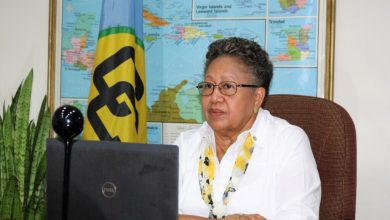CARICOM Secretary-General Dr Carla Barnett addressed the Donor Round Table Discussion of the CariSECURE Citizen Security Conference, held virtually on Wednesday, 1 September 2021.
Below we present the Secretary-General’s remarks:
- Mr. Clinton White, USAID Regional Representative;
- Ms. Valerie Cliff, UNDP Resident Coordinator;
- CariSECURE Team Leader and Members;
- Representatives of International Development Agencies;
- Representatives of Regional Security Institutions;
- Ladies and Gentlemen.
I sincerely wish to thank the organisers for extending this invitation to say a few words as this meeting comes to an end, since it allows me the opportunity to emphasise the importance of security to our Caribbean Community. Indeed, the Heads of Government of CARICOM declared Security as the fourth pillar of our integration movement alongside Economic Integration, Foreign Policy Coordination and Human and Social Development.
As you would be aware, the CARICOM Implementation Agency for Crime and Security is the Regional Institution established to administer a collective response to the crime and security priorities of CARICOM. However, the issue of Crime Prevention falls within the ambit of the CARICOM Secretariat.
In this regard, the CARICOM Social Development and Crime Prevention Action Plan was developed jointly by the Secretariat and the United Nations Office on Drugs and Crime. It is cross-sectoral and has five priority areas – Prevent and Reduce Violence; Foster Social Inclusion; Promote Re-integration; Empower Victims; and Protect the Environment and Economic Resources.
The Plan is an integral aspect of the broader CARICOM Crime and Security Strategy and falls under its second Strategic Goal: Crime Prevention – Addressing the Causes of Crime and Insecurity and Increase Public Awareness of the Key Risks.
Programmes and projects have been designed and implemented through the CARICOM Secretariat; the most recent being the Crime and Violence Prevention Project which was one component funded under the 10th EDF Crime and Security Cooperation Programme. Those activities were implemented during the two year period ending November 2019. As the focus today is on data, it is significant to note that the interventions for one of the Outcomes were based on data acquired through Rapid Assessments, during the first activity.
Further, one of the four Technical Working Groups under the Caribbean Basin Security Initiative is on Preventing Crime by Focussing on At-Risk Youth and Vulnerable Populations. The Secretariat is responsible for coordinating the Meetings of this Technical Working Group. As part of its Action Statement for 2020, the following issues were listed as priority areas: Juvenile Justice; Strengthening Evidence for Crime Prevention; Community Based Youth Violence Prevention; Gender Based Violence; and Violence against Children.
With regard to the second priority area, Strengthening Evidence for Crime Prevention, the Technical Working Group committed to “fostering regional cooperation and building capacity to collect, analyse and use reliable data to inform the design of effective citizen security and social interventions, and to cultivate a culture of research and learning”.
In order to achieve this Technical Working Group indicated that it would, firstly,
“Collaborate to harmonise sources of data on crime and violence in accordance with international standards for effective data collection, analysis, sharing and decision-making;”
Secondly,
“Create a learning community to share best practices on evidence-based crime and violence prevention; and
Thirdly,
“Use empirical evidence to improve the design, implementation and coordination of crime and violence prevention initiatives in targeted communities.”
The CariSECURE Project which is designed to strengthen evidence-based decision-making for Citizen Security in the Caribbean is therefore a most relevant tool. We know that we need reliable data to ensure that intervention decisions are evidence-based as well as to measure the impact of our interventions..
This Project has focussed “on strengthening regional and national police forces and statistical offices by providing personnel with the necessary tools, skills and guidance needed to collect, analyse and disseminate citizen security data for the effective formulation, monitoring and evaluation of evidence-based citizen security policies and programmes”.
The beneficiary Member States, namely, Antigua and Barbuda, Barbados, Grenada, Guyana, St. Kitts and Nevis, Saint Lucia, St. Vincent and the Grenadines, and Suriname have all benefitted in invaluable ways. It has certainly been of value to the stakeholders at the various levels within the police, healthcare, judiciary, relevant Ministries and national crime observatories.
To the United States Agency for International Development (USAID), the United Nations Development Programme (UNDP) and related sub-agencies, please accept my sincerest appreciation on behalf of our eight (8) Member States.
This progress should encourage further support in the areas outlined for this afternoon’s session – Criminal Justice Reform, Trafficking in Persons, Data-Driven Decision Making and Measuring Impact. These are all issues that are also high on the Community’s crime prevention and security agenda.
I look forward to continued collaboration with our Development Partners, and their unwavering and substantial support to the strengthening of the fight against crime and violence, as together we strive to make the Region an absolutely safe and secure one for both the current and future generations.
All the best and thank you.






